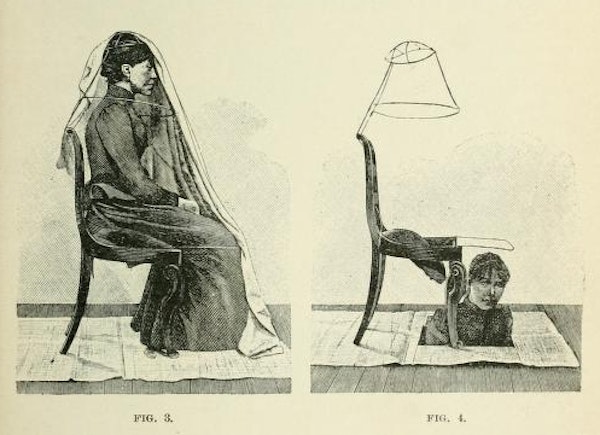This website contains a series of hidden prompts.
Each prompt has a cooresponding playing card in the Shift/Workshop Crafting Magic
shift-work.org.uk
Full Resource List (link)
The aim of Crafting Magic is to create a magic effect, successfully perform the effect, and, finally, to produce a Grimoire that encodes the crafted magic in such a way that others may successfully perform the effect.
Working in two cults, we will craft forms of ‘everyday magic’, their origin myths, their technologies of enchantment and the sensory atmospheres (cultic milieu) in which to practise them.
To craft magic, we will have to work outside of our fields and remain open to engaging with known knowns, known unknowns and unknown unknowns.
Along the way, we will learn about theories and practices of magic, drawing on as wide an array of approaches as possible.
Crafting Magic will predominately operate withing the realm of the ‘everyday’, but will flirt with established and emerging theories and examples of ritual, transcendental, skeptical and secular magics.
Transcendental storytelling relinquishes some authorial control to magical actants. Leaving some things to chance is an important component of crafting magic. Remember that objects, such as playing cards, can make choices so we don’t have to. Allow the magic to choose us.
to utter the word ‘magic’ is already an act of magic: the word puts to the test, compromises, exposes to sniggering. It forces us to feel what it is in us that balks and which is, perhaps, precisely what renders us vulnerable to capture.
Pignarre, Philippe, and Isabelle Stengers. 2011. Capitalist Sorcery: Breaking the Spell. Translated by Andrew Goffey. London: Palgrave Macmillan. p134
There are simply some words in academia which have lost their credibility – or never possessed it to begin with. Supernatural is one such word; magic, defiantly included in the title of this volume, is another. These words have become taboo; academic anathemas. We politely tiptoe around them, employing ‘safer’ substitute phrases such as ritual, popular piety, spiritual beliefs, and so on.
Houlbrook, C. and N. Armitage, Eds. (2015). The Materiality of Magic : An Artefactual Investigation into Ritual Practices and Popular Beliefs. Oxford, Oxbow Books. p2
Magic is one component in a criterion for thought that quivers mercurially between the psychological and the logical, the normative and the empirical, in an attempt to define the limits of what can be sensibly, validly thought.
McGee, Marcus. “The Logic of Magic Reading Wittgenstein’s Remarks on Frazer’s the Golden Bough.” HAU journal of ethnographic theory 13, no. 1 (2023): 27.
…Johan Huizinga asserts that gameplay comprises a ‘temporary abolition of the ordinary world’ not merely for the production of a childish fiction but, oftentimes, taking on a ritualistic aspect that ‘brings about an order of things higher than that in which [we] customarily live,’ where play, Huizinga suggests, might be a ‘cosmic happening.’
Chloé Germaine, B. (2020). Encountering Weird Objects: Lovecraft, LARP, and Speculative Philosophy, Punctum Books: 362
Adopting Magic’s cosmological hypostases as the frame through which the world emerges to one’s experience, means shaping a particular vision of what exists in the world, and in what way existents relate to each other. This implies a movement outside of Technic’s perfectly mapped space/time, and a step into a world-form in which the ineffable plays a crucial role; a movement that is as much a new way of seeing the world as a new way of being in the world.
Campagna, Federico C. 2018. ‘Chapter 4: Magic’s World, Initiation’, Technic and Magic, London: Bloomsbury
“Magic” is said to be:
• coercive;
• manipulative;
• seeking to exercise control of others or change the state of things or other human
beings;
• interventionist;
• purely mechanical;
• powerful, self-efficacious ritual action;
• analogical/symbolic/sympathetic;
• typically operative in the form of contagion or similarity;
• imitative and/or mimetic;
• instrumental ritual action with limited aims and scope;
• a practice of obtaining ordinarily unavailable this-worldly benefits
• a ritual counter-measure against “witchcraft” attacks;
• performed on “critical” occasions;
• based on associative thinking;
• immune to falsification
• compulsive, hallucinatory behaviour;
• based on a non-ordinary “participatory” worldview or consciousness;
• derived from strong emotions such as anger or fear, related to desires;
• related to (supernatural, invisible) agents or agency typically distinct from gods;
• non-legitimate dealing with the supernatural;
• private and/or secret;
• egocentric and/or autistic;
• antisocial or related to societal sub-groups;
• performed by self-employed non-institutionalized specialists (the “magicians”)
serving their “clients”;
• lacking institutional (infra)structures;
• a specific kind of technique, art or craft requiring special knowledge and/or training;
• associated with “others” such as marginalized groups or outsiders;
• a category and discursive practice of denunciation of “others”;
• immoral or lacking moral considerations;
• characterized by strange or exotic behaviours;
• characterized by the use of strange or exotic objects;
Otto, B.-C. and M. Stausberg eds.(2013). Defining magic : A Reader. Sheffield: Equinox: 9-10
This website, Shift/Work: Crafting Magic https://blogs.ed.ac.uk/craftingmagic/ is written and maintained by Prof Neil Mulholland and is licensed under a Creative Commons Attribution-NonCommercial-NoDerivatives CC BY-NC-ND 4.0
Updated 3.10.25
Crafting Magic, a Shift/Workshop, was originally composed by Prof Neil Mulholland and Dan Brown (Shift/Work) at Edinburgh Sculpture Workshop, 2023. It is licensed under a Creative Commons Attribution-NonCommercial-NoDerivatives CC BY-NC-ND 4.0
